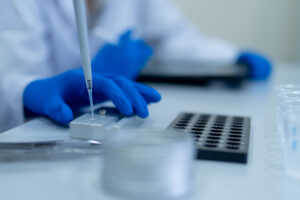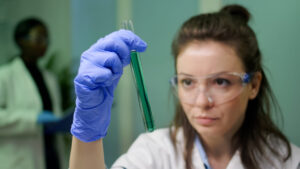Very few types of genetic testing are done online. Many types of genetic tests can be ordered online for at-home testing, and quite a few online options are available to help analyze and review the results of your genetic testing, once you have them.
Genetic counseling online
Genetic counseling is also available online, whether before, after, or aside from genetic testing, as one of your health options.
A genetic counselor is a trained healthcare professional who can speak to you about what testing may be advisable for you, what your test results may mean, and how to consider and deal with the outcome of your genetic testing. Genetic counseling can be done online, or even on the phone in many cases, as it is in most cases based on a verbal conversation between you and your counselor.
Genetic counselors can identify families and individuals who are at risk for, or who may already have, various genetic disorders. They can look into and investigate family history about possible genetic diseases or syndromes and their symptoms. They can estimate and interpret inheritance patterns and the likelihood of recurrence. And, they can review treatment or planning options with the individual or family being counseled.
Facial analysis online
This is a relatively new option in online genetic testing. Facial analysis can be a great help when trying to determine, identify or confirm a possible genetic syndrome in your child or loved one. It is not however recommended for ancestry or genealogy purposes, or indeed for paternity testing, regardless of familial resemblance,
Facial genetic analysis for genetic testing purposes has often been used in a clinical setting, that is to say, doctors and other healthcare professionals know what to look for on a visual level, and this is part of their learned knowledge, which can be thought of as their internal or mental database. But now, with new technology, big data big data analysis, and online testing availability, new possibilities are in play.
How does facial analysis work?
A phenotype is the sum of a person’s observable physical features. This includes such traits as eye color, height, and blood type.
The genotype is the part of the phenotype that is built by the genes: a good portion of it is hereditary, that is, we get it from our parents and family, but some of the genotype can be based on various environmental factors.
Thus, what we call the phenotype is simply the things about a person that we can see or test for, and quite a few things can be understood based on the phenotype. This includes certain genetic disorders that can be recognized based on physical characteristics.
For instance, Down syndrome is a common and recognizable chromosomal disorder that is visually identifiable to the average passerby, although that’s not on a clinical level of diagnosis. Albinism, or an albino person, is something a random observer might notice too.
Marfan syndrome, on the other hand, may strike a chord and cause an average individual to think there’s something recognizable about the person’s physical appearance (think tall, lanky Abraham Lincoln, who some people believe may have had the syndrome), needs quite a bit of visual and genetic analysis before a confirmed diagnosis.
Many diseases and disorders, both rare and common, have associated markers. That means that a trained healthcare professional could note a certain angle of a patient’s ears, or a specific appearance of the eyes or even eyebrows, and jot down in their notes that this individual should be referred for such-and-such genetic testing. That’s phenotype-based diagnosis, and will usually be backed up by further analysis.
Modern facial recognition technology for accelerated disease diagnosis online
Still today, many or most people in the world with a rare disease are misdiagnosed, or remain undiagnosed. And those who are diagnosed may take years to receive a correct diagnosis, or indeed any diagnosis at all. This is sometimes due to a lack of access to qualified genetic professionals or relevant testing, or to extremely long wait times for testing and consultation. High costs can also delay or obstruct testing.
FDNA uses a unique next-generation phenotyping (NGP) technology that helps clinicians capture and review information about you or your child’s health profile, access helpful services, and, when needed, get advice from other experts. Using your ordinary photo of yourself, your child, or your loved ones, the FDNA system can detect patterns and features that are then compared against thousands of known symptoms.
With this photo matching analysis in hand, the system can identify one or more possible syndromes with similar facial characteristics to those scanned from the photo image, with a very strong identification accuracy: 90%.
Based on the result of the NGP scan analysis, a qualified geneticist from the FDNA network is assigned to analyze all the results and associated information, talk it over with the person or family being screened, and order tests that may help identify possible genetic conditions and try to get closer to a diagnosis.
How can an online genetic testing diagnosis help?
Genetic conditions and related disorders can raise a variety of possible obstacles to optimal social, physical, and mental health development. Genetic counseling is advisable as early as a possible concern is detected, to plan for your own, your child’s, or your loved one’s highest level of developmental care, potential therapy, and long-term well-being.
For babies and children with genetic diseases and syndromes, genetic counseling can be a crucial step in determining whether and how to intervene to try to offer the best possible outcomes for their health, comfort, development, and social feelings and to plan for their future.



